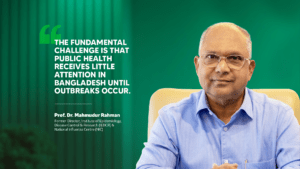1. Let’s start with your educational background and career.
Professionally, I’m a Mechanical Engineer. I got my undergraduate degree from the Military Institute of Science and Technology (MIST) and then pursued my MBA in Marketing from North South University. Moreover, I have a professional degree in supply chain and as well as certified in Project Management Profession. Besides, I was involved in various forms of training.
My career started in the CNG sector, which was the beginning of the sector itself in Bangladesh. I worked in this sector for about 11 years. Gradually, when the industry was inclining towards LPG from CNG, I started focusing on UNIgas development. After LPG was launched, I got the opportunity to work at ATEC Biodigesters, an Australian multinational company. They were established in Australia in 2015 and later expanded globally, which led to initiating a branch in Bangladesh. My entire career has been associated with this business, which steered me to grow immensely and gratify in a prominent role as ATEC’s Director now.

2. What was the motivation behind joining ATEC Biodigesters? Tell us about the roles you are currently playing.
Building a venture can be equally interesting and challenging. I love it, and the three organizations I worked in, I was able to see them grow since their inception. I was enjoying my work, and I have always been passionate about working for a multinational company. Even though it was a fairly new company, I thought about how exciting it’d be to develop something in my own way. I was excited and ready to experience the decision-making role. I was prepared to surface the disappointment if it didn’t click right. But if it does well, we’d know that we were responsible for something great.
Our business idea had great prospects, and we love our product. It complements perfectly with the Bangladeshi culture. Bangladesh is based on agriculture, and I believe that our future would be highly dependent on the renewable sector and sustainable energy. The government ultimately started to discourage the use of CNG and right now, the LPG sector is booming. And the product that ATEC Biodigesters brought to me is very sustainable and would benefit our country, and if I can assist in the process, I’d consider it a lifetime achievement.
3. With what vision did ATEC Biodigesters start their journey? And why did they choose Bangladesh as a suitable marketplace?
The reason behind choosing this market is the potential of Bangladesh. There are 3-4 million farmers in this country with 3-7 cattle each, and we work on biodigesters and biogas, which is basically extracted from cattle manure. Plus, the government has been trying to promote the concept for the last 15 years, and they are providing us with subsidies. There wasn’t any suitable technology to promote biogas because conventional ways were being used to run businesses. But we came up with a solution that was perfect for any county in this subcontinent. Whenever there’s a natural calamity in Bangladesh, such as flood, which happens quite often, the conventional projects get ruined, but the ATEC product is flood-protected and compact, portable, and even easy to install. Our vision was to install 1 million ATEC products in 5 different countries over 10 years. And in Bangladesh, they’re planning on emerging 20 thousand systems in the next 3-4 years.
4. Since the concept of ATEC is very new, how did ATEC Biodigesters convince so many farmers to adapt to it?
The business started after the pandemic hit, for which it was pretty challenging. The government looks after the Infrastructure Development Company Limited (IDCOL), and we got enlisted as their vendor. Then the ones they used to distribute through, they became our partners.
These partners used to sell the conventional systems and so I approached them, showed them a presentation, and gave them a brief about our product. And when they got to know about our governmental license and IDCOL vendor certification, it became very easy to convince them and get their distribution channel.
We also started getting affiliated with veterinarians so that when they’d treat any cattle, they could promote our product, explaining the benefits to the local farmers.
5. How’s the response so far?
The response has been great. As I told you, we just launched our product, but we have already mounted many in the last 1 month and are also installing a few currently. Through this investment, we’re changing the standard of life. Besides, people are getting free gas to cook whenever they want as well as top-notch fertilizers to either use or even sell to others. So overall, they’d be able to save and also earn at the same time.

6. What benefits do ATEC systems provide that are different from the conventional systems?
The conventional systems required a large field and a long time, 7-15 days, to be installed. But our system only needs space with a diameter of 5-6 feet and it takes around 2.5 – 3 hours to develop. You can also move it whenever you need to which makes it very convenient for the farmers.
7. What were the initial challenges that ATEC Biodigesters faced in Bangladesh?
Whenever a foreign country wants to start a business in Bangladesh, they face many common challenges regarding compliance – that was the challenge. And as the product was completely new, making people aware of the idea and its benefits was difficult. Still, people are not habituated to it and we are facing this challenge. Almost 75% of the people in our country don’t have access to a clean cooking system. Besides, each year, about 35 lacs people lose their lives due to conventional cooking using woods. But in 3 years, if I can make 20 thousand people dependent on their own fuel through our products, I can shift them from conventional cooking to a clean cooking system. This can even stand out as an example of how Bangladesh is making a revolutionary change in the energy sector.
8. Where do you want to see ATEC Biodigesters in the next 5 years?
In Bangladesh, at least for the people who have cattle at their homes, I want to see 30-40 thousand systems have been introduced. I want it to help in upgrading peoples’ lifestyle and I want the savings these people make to be invested in their future needs, such as education. Also, I want our country to flourish with the help of sustainable energy and ultimately reduce carbon emission.
9. Tell us about ‘Shobuj Shokti’.
‘Shobuj Shokti’ means green energy, and it has two outputs. First, we’re getting biogas and second, we’re getting fertilizer. So, you can say it’s a powerhouse which can change a farmer’s life because he’s being able to reuse the waste products.
Bangladesh has a lot of resources, not all countries are as blessed as we are. We have resources but we don’t know how to capitalize and utilize them, because of which we may face grave problems in only about 8-10 years.
Globally it is known as ATEC, and when it came to Bangladesh, I thought that rather than focusing on the brand, there should be a common name for it as then it will be easier for people to connect with the project. Hence, we launched the biodiversity project called “Shobuj Shokti” for people in Bangladesh to connect to and be proud of doing wonders using sustainable energy in the country.
10. As it’s a new product, how did you find the talented people for this particular brand?
There is a very rigorous interview process. I didn’t take anyone from the biogas sector, but yes some of them do have some experience related to it. As it was a new product, I wanted people with fresh concepts and an open mindset to be a part of the venture.
In our interviews, we look for A players, they should be goal-oriented, be able to work in teams, and be continuously developing themselves. We took our time in every recruitment session and hired those who had these 3 qualities.
We even took 25-30 days for one recruitment. The interview was pretty structured, and we called it a top grading interview. Now we have a very lean structured and smart team – a small team that can do multiple tasks.

11. How is ATEC Biodigesters coping with COVID-19?
If COVID-19 came 20 years ago, we would have been in big trouble. But now, the good thing is that we’re technologically equipped. We have done a lot of interesting work – I have done face to face communications but then we did virtual seminars through group calls for everyone’s safety.
We categorized them and called them to the seminars and have done certification programs. At first, I discussed the ideas with the owners, and then the team members. We elaborated on the product details to create a clear picture, regarding the product picture. We organized a 3-phase certification program involving 1 certificate for basic training, 1 for concept training and they received the last 1 after they were successfully done with the previous 2 training sessions.






